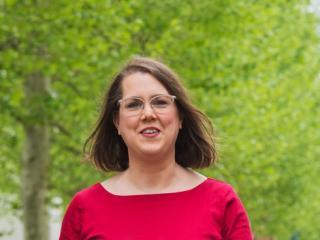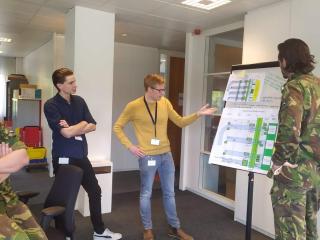“We open each other’s eyes and look at things from a broader perspective”
Let’s meet... Kim Beenhakker and Mireille de Beer. Eighteen months ago, they made a video as part of their application to work at the Tranzo Academic Collaborative Center for Living with an Intellectual Disability (AWVB) at Tilburg University; they were subsequently welcomed with open arms as co-researchers with experiential knowledge. “We feel right at home,” says Mireille, “here, we are treated just like any other colleagues.” Kim adds, “That’s something that hardly ever happens.”
The value of the experiential knowledge Kim and Mireille bring to the table at AWVB for a day-and-a-half every week is enormous. To be able to develop knowledge that is useful to science and everyday practice alike, the researchers at the Academic Collaborative Center require not just academic but also professional and experiential knowledge. These three knowledge sources are each vitally important in the research carried out by the AWVB. The result is an equal working relationship as the research is undertaken.
An equal partnership
This equal partnership has its origins in the vision of Professor Petri Embregts, who is in charge of the Tranzo Academic Collaborative Center for Living with an Intellectual Disability. The Academic Collaborative Center is home to a long-term partnership involving fourteen care organizations for people with an intellectual disability, the Advocacy organization for people with an intellectual disability (LFB), and Tilburg University.
Scientists and science practitioners (professionals working both in the care field and as researchers at the university) alike are involved with the research. They are examining the question of how they might improve care for people with an intellectual disability, for example by assisting them in making decisions for themselves and gaining control over their lives while connecting with the people who are important to them.
Knowledge sources
“Ever since the founding of the AWVB almost ten years ago, our work has been based on the vision that research should be shaped for and together with people with an intellectual disability,” explains Petri. "The knowledge that people with an intellectual disability, their relatives, and professionals all possess is invaluable in this context, but such knowledge is contained mostly in the minds of those concerned, rather than being set down on paper. What do they find important? Where are the gaps in our knowledge? We quickly discovered that the experiential knowledge of people with an intellectual disability themselves should be the pivotal factor."
The more knowledge sources we can link up, the better
Professor Embregts takes a sheet of paper and draws on it to show how Tranzo links up three knowledge sources. Three circles overlap each other at one point – the point that matters most. “The more we are able to link up the knowledge possessed by scientists, professionals, and experiential experts, the more research results can be made relevant to everyday care practice and to professional study programs. That way, new knowledge can really be put to use.” The work carried out at the Academic Collaborative Center has been project based, involving partnerships with experiential experts, since it was established. In order to structurally embed the exchange of knowledge at the Center, Kim and Mireille have spent the past eighteen months employed as co-researchers, within the framework of the Participation Act.
Equality
Mireille admits that equality in her working relationships with colleagues is the most important thing in her job. This is something she has experienced throughout her time at the Academic Collaborative Center. “I also think it’s important that you are able to develop something new, together with those in the working field, and that something is actually done with the research for people with an intellectual disability. I used to think that research often ended up in a desk drawer somewhere, but I now know that is fortunately not the case.”
Being able to learn yourself is very important
Mireille and Kim are currently working with another researcher on their own project, under Petri’s direction. While Mireille is researching the possibilities of deploying experiential experts, Kim is setting up an advisory council consisting of people with an intellectual disability. They both state that they have opportunities to learn and that their tasks are not taken over by anyone else. “Being able to learn yourself is very important,” emphasizes Mireille.
Transcending vision
Experiential expertise is a key topic in both projects. Kim noticed during the interviews for positions on the advisory council, for example, that people with an intellectual disability find it difficult to deploy their own experiences for those with an intellectual disability in general. This transcending vision contains the heart of experiential expertise. And that is where the challenge lies for Kim. “As chair of the advisory council, I have to ensure that each of the members uses their own knowledge to advise researchers about their work.”
According to Petri, Mireille and Kim are better placed than anyone to help demonstrate to other people the position of research in the relationship between science and the practical field. “It means opening each other’s eyes and looking at things from a broader perspective.”
On the photo (l to r): Petri Embregts, Kim Beenhakker, Mireille de Beer. Photo: Wilfried Scholtes
Date of publication: 2 July 2020



